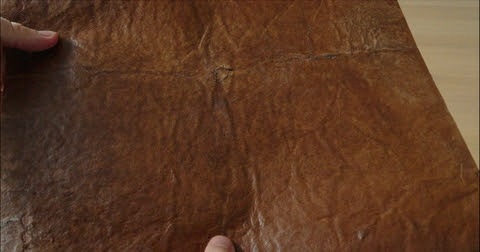Cultivated leather pioneer Qorium has released footage of its latest sample of lab-grown leather. Measuring 35x35 cm, the material has been produced using the company’s newly scaled-up tissue bioreactor, representing proof of concept for full-scale commercialization of the company’s production process, which takes a small sample of skin cells from a living cow and reproduces them in a lab to create leather with the same strength, durability and appearance of traditionally-produced animal-derived leather.
 Measuring 35x35 cm, the material has been produced using the company’s newly scaled-up tissue bioreactor, representing proof of concept for full-scale commercialization of the company’s production process. Image Credit: Business Wire
Measuring 35x35 cm, the material has been produced using the company’s newly scaled-up tissue bioreactor, representing proof of concept for full-scale commercialization of the company’s production process. Image Credit: Business Wire
When produced at a commercial scale, Qorium’s material will require a fraction of the water and energy needed to rear and process animal hides, minimising climate impact while eliminating animal welfare issues – all critical considerations for consumer brands. Qorium is partnering with a range of high end fashion and automotive brands to co-develop its materials and to become a scaled supplier.
The company has accelerated its growth trajectory following a recent funding round, announcing the hire of a new CFO, and investing in new equipment at its Maastricht University-based lab.
Qorium CEO Michael Newton said, “this sample is tangible proof that a future where high quality, high-performing leather can be produced on-demand, without the animal welfare and environmental disadvantages of traditional material, is just around the corner. The challenge of scaling-up a process has been a tough one, and this latest breakthrough is a testament to the hard work of our excellent science and engineering teams.”
Qorium founder Mark Post said, “The fact that with a relatively small team, in a relatively short amount of time, we have been able to create high-quality sheets of leather that demonstrate scalable production processes shows that we’re on track towards having a product that’s ready for market. From a science perspective, we still have much work to do but the principal challenges are now overcome. The next pieces of the puzzle are focused on continued product optimization, cost reduction and process engineering, where we’re already seeing very positive progress. The future certainly looks very promising for cellular agriculture.”